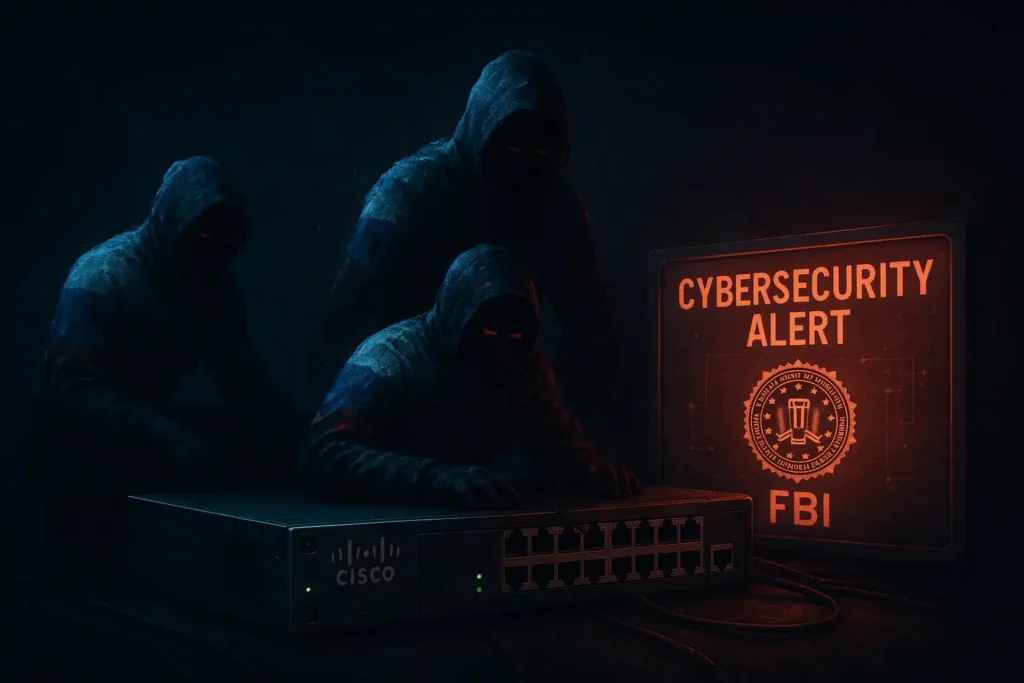Key Highlights
- FBI and Cisco Talos warn of a Russian state-backed hacking campaign exploiting an old Cisco flaw.
- Attackers are using CVE-2018-0171 (Cisco Smart Install vulnerability), unpatched on many devices.
- Thousands of network devices worldwide, including U.S. critical infrastructure, have been compromised.
- Hackers linked to Russia’s FSB (Static Tundra/Berserk Bear group) are behind the campaign.
- Security agencies urge organizations to patch, disable Smart Install, and audit network gear immediately.

A Global Cybersecurity Alarm
On August 20, 2025, the FBI and Cisco’s Talos threat intelligence unit issued a rare joint warning: Russian state-backed hackers are exploiting an old Cisco vulnerability to infiltrate critical infrastructure and corporate networks worldwide.
According to Reuters, the campaign is linked to a hacking group known as Static Tundra, also called Berserk Bear or Dragonfly, which is tied to Russia’s Federal Security Service (FSB).
This group has been quietly active for over a decade, but the latest alert suggests their operations are more aggressive, widespread, and persistent than ever before.
The Cisco Flaw at the Center of It All
The attackers are targeting CVE-2018-0171, a vulnerability in Cisco’s Smart Install protocol, which allows automated configuration of network switches. Cisco patched the flaw back in 2018, but many organizations never applied the fix—or are still running end-of-life devices with no vendor support.
This oversight has left thousands of devices open to attack. As CSO Online reports, the hackers have been able to:
- Steal configuration files from Cisco devices
- Deploy SYNful Knock, a stealthy implant that survives reboots
- Modify network settings to maintain long-term access
- Redirect traffic through malicious tunnels
These aren’t quick attacks—they’re part of a long-term espionage campaign, designed to monitor and infiltrate communications quietly over time.
Who’s Being Targeted?
The primary targets are organizations with high strategic value: telecom companies, education institutions, manufacturing firms, and especially U.S. critical infrastructure.
But this is not just a U.S. problem. Cisco Talos has observed the same activity across Europe, Asia, and Ukraine, where the group intensified its efforts after the Russia-Ukraine war began (CyberScoop).
For Indian readers, there’s a lesson here too: many enterprises, ISPs, and government agencies in India rely heavily on Cisco equipment. If outdated devices are left unpatched, they could become part of the same global espionage campaign.
Read More
Why This Matters
This isn’t just another hacker story. The fact that a six-year-old vulnerability is still being exploited shows how dangerous patching delays and legacy hardware can be.
- It proves that attackers don’t always need “zero-days” (new, unknown bugs). Old, neglected flaws are often just as effective.
- It shows the increasing geopolitical nature of cyberattacks, where state-backed groups target infrastructure not for profit, but for long-term intelligence gathering.
- It highlights how critical it is for organizations—big or small—to regularly audit their network devices, disable unnecessary services, and apply vendor patches.
As The Hacker News noted, this campaign may be “one of the most persistent espionage efforts against network devices ever recorded.”
What Organizations Should Do
Cybersecurity experts recommend a few urgent steps:
- Patch Immediately – Apply Cisco’s fixes for CVE-2018-0171. If devices are too old to support updates, consider replacing them.
- Disable Smart Install – Unless absolutely needed, this protocol should be turned off.
- Audit SNMP Access – Change weak community strings and limit access.
- Check for Compromise – Look for unusual traffic, modified configs, or unauthorized admin accounts.
Cisco has published updated advisories, and the FBI encourages organizations to report suspicious activity to law enforcement.
Final Thoughts
The Russian Static Tundra campaign is a reminder that cybersecurity is not just about chasing the newest threats—sometimes the biggest danger comes from old, neglected flaws.
For businesses in India and worldwide, the message is clear: update, audit, and monitor your network gear. Attackers are patient, and they only need one forgotten weak spot to get in.
As the FBI’s warning shows, when state-backed hackers exploit outdated systems, the consequences go far beyond IT—they affect national security, economic stability, and public trust.



